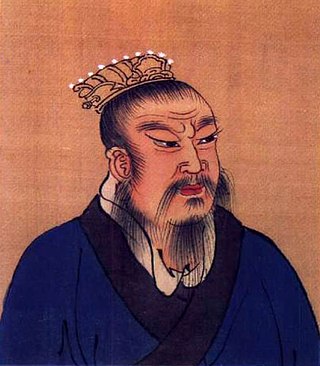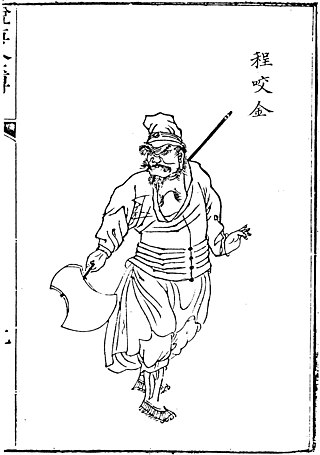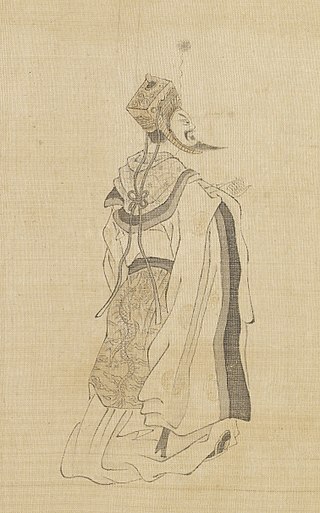
Emperor Gaozu of Han, also known by his given name Liu Bang, was the founder and first emperor of the Han dynasty, reigning from 202 to 195 BC. He is considered by traditional Chinese historiography to be one of the greatest emperors in history, credited with establishing the first Pax Sinica, one of China's longest golden ages.

Chen Yuanyuan was a Chinese courtesan who later became the concubine of military leader Wu Sangui. In Chinese folklore, the Shun army's capture of her in 1644 prompted Wu's fateful decision to let the Qing armies enter China proper through Shanhai Pass, thereby sealing the fate of the Ming dynasty.
Ying Ziying, also known as Ziying, King of Qin, was the third and last ruler of the Qin dynasty of China. He ruled over a fragmented Qin Empire for 46 days, from mid-October to early December 207 BC. Unlike his predecessor, he ruled as a king instead of emperor. He is referred to in some sources with the posthumous name Emperor Shang of Qin (秦殤帝) although the Qin dynasty had abolished the tradition of according posthumous names to deceased monarchs.

Li Jue, courtesy name Zhiran, was a Chinese military general, politician, and warlord serving under the autocratic warlord Dong Zhuo during the late Eastern Han dynasty of China. He later succeeded Dong Zhuo as the leader of the Liang Province faction after Dong Zhuo was murdered in a coup d'état, and was able to take over the Han imperial capital Chang'an, keeping Emperor Xian as a hostage. Despite being adept in military affairs, he was inept at politics, quarrelling with his fellow generals and making the bad decision to let Emperor Xian escape, greatly decreasing his power and precipitating his downfall.
Xu Rong was a military general serving under the warlord Dong Zhuo during the late Eastern Han dynasty of China.
Chen Tai, courtesy name Xuanbo, was a military general and official of the state of Cao Wei during the Three Kingdoms period of China. He was a son of Chen Qun and a maternal grandson of Xun Yu. Chen Tai was very knowledgeable in the art of war, and so led his men as if they were his own children. When the regent Sima Shi began abusing his power and the emperor Cao Mao died under very suspicious circumstances, Chen Tai expressed his deep loyalty to the Cao Wei state by donning mourning garments at Cao Mao's funeral.
Tian Yu, courtesy name Guorang, was a military general of the state of Cao Wei during the Three Kingdoms period of China.
The Battle of Jwawon was a battle between the forces of the Han's Xuantu Commandery and Goguryeo. It resulted in a victory under the command of Myeongnim Dap-bu during the 26th year of the reign of King Sindae, the 8th ruler of Goguryeo.
Mao Wenlong, courtesy name Zhennan, was a Chinese military general of the Ming dynasty, best known for commanding an independent detachment based in Dongjiang, a strategically important island in the Yellow Sea that defended the coastal corridor into the Ming vassal state Joseon, where he engaged harassing naval and amphibious battles against the Manchu-led Later Jin. He was also known for excelling in artillery warfare and successfully incorporating Western-style tactics into the Chinese military.

Cheng Zhijie, courtesy name Yizhen, better known by his original name Cheng Yaojin, was a Chinese general who served under the emperors Gaozu, Taizong and Gaozong in the early Tang dynasty. His portrait was on display in Lingyan Pavilion along with those of another 23 officials who rendered meritorious service to the Tang Empire during the reign of Emperor Taizong.
The Four Major Cases of the early Ming dynasty refer to the following mass executions and persecutions perpetrated by the Hongwu Emperor at the start of the Ming dynasty:

Zhang Gongjin, courtesy name Hongshen, titled Duke of Tan, was an official and general during the Tang dynasty of China. He played an important role in the Xuanwu Gate Incident in 626 which helped Emperor Taizong obtained the crown. He was a key general of Tang dynasty during the campaign against Illig Qaghan of Tujue. Because of his contributions, he was listed as one of 24 founding officials of Tang dynasty honored on the Lingyan Pavilion.

Qutu Tong, titled Duke of Jiang, Xianbei name Tandouba (坦豆拔), was a general in the Sui and Tang dynasties of China. He was listed as one of 24 founding officials of the Tang dynasty honored on the Lingyan Pavilion due to his contributions in wars during the transitional period from Sui to Tang.

Yin Jiao, better known by his courtesy name Kaishan, titled Duke Jie of Xun, was a general and officer in Sui and Tang dynasties of China. Because of his remarkable contributions during the unification wars of Tang dynasty, Yin Kaishan was listed as one of 24 founding officials of the Tang dynasty honored on the Lingyan Pavilion.

Shan Xiongxin was a general, top warrior and peasant uprising leader during the transitional era between the Sui and Tang dynasties.
Luo Shixin was a general during the transitional period between the Sui and Tang dynasties of China.
Pei Xingyan was a general during the Sui dynasty who was known for his superior fighting skills on the battlefield. He was also a highly celebrated warrior in popular culture and traditional Chinese dramas.
Zhang Xutuo, courtesy name Guo, was one of the most celebrated generals during the Sui dynasty. He was best known for his achievements in suppressing rebellions and uprisings during Emperor Yang's reign.

Liu Hongji, titled Duke Xiang of Kui, was a general and officer in the early Tang dynasty of China. He was listed as one of 24 honored founding officials of the Tang dynasty at Lingyan Pavilion.
Ma Sanbao was a Chinese general during the Tang dynasty. He played an important role in the establishment of the Tang dynasty.









